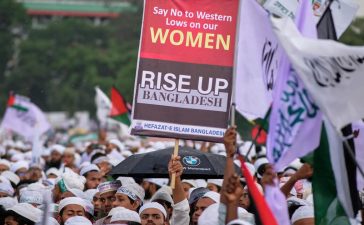A ruling by the European court of human rights ordering authorities in Cyprus to pay damages to two Syrian refugees found to have been prevented from applying for asylum has been welcomed as a “perfect” victory by campaigners.
Lawyers said Tuesday’s judgment would encourage others to follow suit, including an ever-growing group of asylum seekers stranded in the UN-patrolled buffer zone of the war-split country.
“For four years the migration policies of Cyprus have relied on human rights violations, and illegal pushbacks at land and sea,” said Nicoletta Charalambidou, a prominent human rights attorney who represented the refugees. “This ruling has exposed these illegal practices and it has set a precedent. It is a perfect win for human rights.”
The Strasbourg court found that Cyprus failed to comply with the European convention on human rights and basic tenets of refugee law when the Syrians, who had been intercepted at sea, were prevented from disembarking and “essentially returned” to Lebanon before their asylum claims were processed.
The two men, cousins from the town of Idlib in their early 40s, “had already spent four years in a refugee camp after they had fled Syria because of the civil war there”, according to the judgment.
“The court could not ignore that they had been stranded at sea for two days under the control of the Cypriot marine police and had not been allowed to disembark to claim asylum,” the justices opined. “There was no doubt that the applicants’ removal from Cypriot territorial waters and their forced return to Lebanon had constituted ‘expulsion’.”
In addition to putting the men at further risk by sending them back to an unsafe third country, the September 2020 incident amounted to “degrading treatment”, they added, citing the considerable distress caused by being kept on a boat for two days without “adequate food or water [or] access to hygiene facilities”.
The EU’s most easterly member state, Cyprus is also partitioned by war, with its Greek and Turkish communities living either side of a ceasefire line since 1974.
President Nikos Christodoulides, who heads the internationally recognised south, said the tribunal’s ruling would be examined. “As a country under occupation we know what being a refugee means, what being forced to flee your homeland means,” he said.
About 200,000 Greek Cypriots were forced to retreat towards the south in 1974 when Ankara, responding to a coup aimed at union with Greece, ordered a full-scale invasion of the island with troops seizing its northern third. In 1983, the territory declared independence, although only Turkey has ever acknowledged the self-proclaimed state.
Asylum seekers who now enter the island via the Turkish-occupied north inevitably cross the “green line” into government-controlled areas in the south because the breakaway state lacks the infrastructure to file claims. Cypriot authorities have taken decisive, and increasingly controversial, steps to rein in flows.
A report released this week by the Border Violence Monitoring Network revealed that in tandem with forcible expulsions, the country had been ramping up the deployment of new surveillance technologies since 2020, in the buffer zone and at its maritime borders. The new technologies, it said, were “facilitating these ongoing rights violations and increasing the ease with which they can be carried out”.
after newsletter promotion
The revelations follow accusations by the UN’s refugee agency that Cypriot police in the south have deliberately pushed back asylum seekers into the buffer zone. Among the 65 people now marooned in the no-man’s land are adults with cancer and at least nine unaccompanied minors who had travelled from Iraq, Iran and Afghanistan. Some have been trapped in the strip for six months, living in tents in the blazing summer heat on land infested with mosquitoes, rats and snakes.
“The state is now providing food but what is required is a sustainable long-term solution,” said Emilia Strovolidou, the UN agency’s spokesperson. “We’re in talks with the government. There are people who’ve been in limbo for months now and psychologically they’re in a very difficult situation.”
But the deputy minister in charge of migration, Nicholas Ioannides, has dismissed claims the country is bound under EU law to examine asylum requests even if lodged by claimants in a transit zone. “Cyprus has taken a decision that it will not accept flows through the green line, particularly as we’ve managed to have zero arrivals via sea,” he said in August.
Charalambidou however said that after this week’s damning court decision, others trapped in the “dead” zone would be emboldened to take legal action. So far 25 cases have been brought against the country by asylum seekers arguing that Cyprus has flouted international law by failing to protect their basic rights.
“There are many more that I will be filing here in Nicosia before the administrative court of international protection and of course this week’s judgment [in Strasbourg] will encourage others,” she said. “At first we saw pushbacks in the sea, now we’re seeing pushbacks in the buffer zone but Cyprus has obligations. It has to provide access to asylum requests wherever they come from and it has to provide dignified reception conditions. It is duty bound to do that under EU and international law.”











